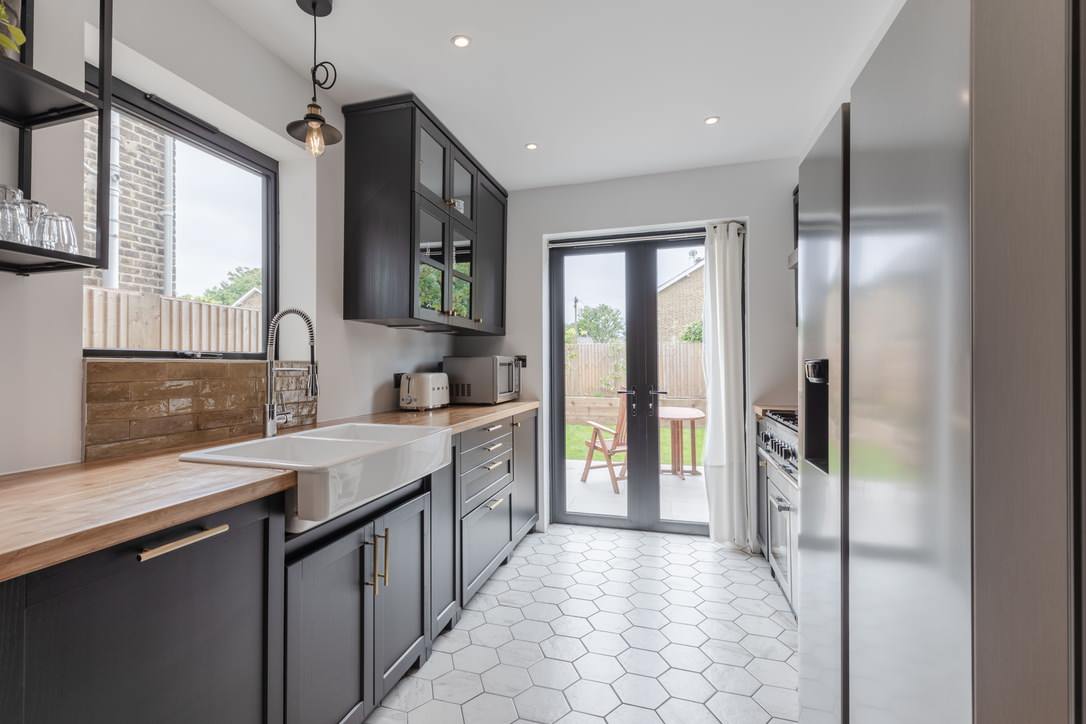Sustainable homes you enjoy living in. Designed with trust, clarity & care.
Here is why you received two dramatically different home remodel quotes

Unhelpful figures
Recently, an interior designer reached out to me on behalf of her clients. The project stopped because they all tried to make sense of two dramatically different quotes from two building contractors.
Without divulging too much information about the situation, let's just say one quote was for £120,000 and the other for £295,000. While interior designers can sometimes advise their clients on renovation costs, they all felt that independent expert support was required to get unstuck.
These situations are common, so I developed a service to address them. I offer to review contractors' quotes, which involves meticulously analysing the scope, specifications, and pricing of builders' quotes.
In this instance, I helped the interior designer and her clients identify gaps, overlaps, and key differences. As a result, they could make an informed decision, confident that they were comparing like-for-like and choosing a contractor who aligned with their project priorities.
This ripple effect of clarity set the tone for the rest of their renovation, making it more likely that they would keep their budget on track and avoid costly surprises later.
Breaking down the numbers: why quotes vary
Why do quotes vary so widely? It simply depends on what goes into them. Here are some key factors:
1. Business model and overheads
A contractor quoting £120,000 might run a smaller operation with fewer overheads, which can result in a lower price. This doesn’t mean they’ll do a poor job—it could simply reflect a leaner business model or streamlined processes. Meanwhile, a contractor quoting £295,000 may operate with a larger team or offer more comprehensive services, which can drive up costs. Both approaches have their strengths, depending on what suits your project.
2. Scope and specifications
Quotes are not just numbers—they represent what’s included and excluded in the scope of work. One contractor might provide an all-inclusive estimate, covering everything from structural engineering to high-quality finishes. Another might quote for the basics, leaving additional costs for you to discover later. Always ask for an itemised breakdown to understand exactly what you’re paying for and to ensure you’re comparing like-for-like.
3. Risk management
Every renovation comes with potential risks, such as hidden damp or structural issues. A higher quote might include contingency plans for these scenarios, offering a more predictable budget overall. A lower quote might handle these issues as they arise, which can mean unexpected costs mid-project. Neither approach is inherently better—what matters is understanding how your contractor plans to manage risks.
4. Materials and quality
The cost of materials can vary widely based on their quality, sustainability, and durability. A higher quote might reflect the inclusion of premium materials, but this isn’t always the case. Similarly, a lower quote doesn’t automatically mean corners are being cut. Clarify what materials and techniques are included and whether they align with your long-term needs and priorities.
5. Contractor workload
A contractor quoting £120,000 might be balancing multiple projects simultaneously, which could mean longer timelines. On the other hand, a contractor quoting £295,000 may dedicate more resources or a larger team to your project, potentially speeding up the process. Both approaches can work well depending on your expectations for timing and communication.
The key takeaway? Focus on the details behind the numbers, not just the price tag. By understanding what drives costs and asking the right questions, you’ll be empowered to choose a contractor who aligns with your project’s needs and your own priorities.

How to compare quotes effectively
Choosing between two contractors isn’t just about the numbers on their quotes—it’s about understanding their approach, ensuring they align with your project, and building a partnership you can trust. Here are some essential aspects to consider when comparing quotes and making your decision:
1. Request itemised quotes early
It’s best to request an itemised quote when contractors first review your plans. This clarity upfront ensures you can compare like-for-like without needing to ask for adjustments later. Once a contractor has invested time creating a detailed quote using their own process, asking them to restructure it can strain your relationship. Respect their approach while gathering the details you need.
2. Look beyond the price
While costs matter, the lowest or highest quote doesn’t automatically mean the best choice. Focus on the scope of work: Are structural engineer reports, project management, or specific materials included? Does the quote cover contingency planning? A well-thought-out quote demonstrates the contractor’s experience and readiness.
3. Understand their communication style
A good contractor-client relationship relies on open communication. Do they explain their quote clearly? Are they open to questions? Smaller contractors may prefer to keep admin minimal, and this could mean clients need to take on more responsibility. For example, preparing a detailed budget for the contractor to review and approve can streamline the process and foster trust.
4. Know your responsibilities
With smaller contractors, clients often take on administrative tasks such as tracking invoices, purchasing materials, or submitting timelines for review. This collaborative approach can strengthen the partnership and keep the project on track. Larger contractors may offer these services in-house, but at a higher cost.
5. Balance questions with respect
Asking questions is essential, but it’s important to strike a balance. Too many questions or requests can confuse the process or frustrate contractors who prefer to focus on the work itself. Aim to invite dialogue and cooperation, not overwhelm them with excessive demands.
6. Prioritise trust and compatibility
Beyond the quote, consider how well the contractor understands your vision and how comfortable you feel working with them. Renovation projects can be lengthy and stressful, so mutual trust and compatibility are crucial.
7. Use resources to guide your decision
To make this process easier, download my Contractor Conversations Helpsheet, a practical guide to asking the right questions and setting the foundation for a successful renovation. This resource will help you approach quote comparisons and contractor selection with confidence.
In the end, comparing quotes is about more than just numbers. It’s about building a team that suits your project’s needs and fostering a working relationship that leads to a successful outcome. By understanding the nuances and taking a proactive approach, you’ll be well-equipped to make an informed decision.
Why early support matters
Building the right renovation team starts well before any work begins. A clear plan and well-reviewed quotes set the foundation for a smooth, cost-effective project. That’s where my services come in:
Contractor quote review: I help homeowners and professionals like interior designers make sense of disparate quotes, ensuring you’re comparing apples to apples and identifying the right fit for your project.
Design and plan service : With a clear and comprehensive plan, you’ll eliminate ambiguities, align your team, and avoid budget overruns. Enquire here about Design and plan.
These early steps have a ripple effect, keeping your renovation on track and saving you from costly mistakes. Learn more about these services on (https://theplacebetween.co.uk).

About me....
In 2020, I started The Place Between to offer design and project management services to home renovators in French and English, in person and remotely. Complete property overhaul has been a defining feature of my life. I am a serial mover and house remodeller. When my first child was 5, he had grown up in six of our houses (four owned and renovated and two transition rentals). For a long time, my life karma has been to repeatedly buy and renovate houses as my "forever home" yet offer them back to the market, significantly improved.
I bring bags of pragmatic communication and intellectual skills to the services. I am Canadian and British, and I have also lived in Belgium and in The Gambia. I studied law and philosophy, worked a as a barrister in Canada and as a human rights lawyer in many countries of Africa, South America and Asia. I am now a certified mediator supporting people who are negotiating to solve construction disputes.
As a renovation consultant, I use my legal knowledge to support compliance with regulatory schemes relevant to home renovations. It is central to my business that it strengthens ethical trade and generates environmentally conscious spaces where workers' rights are affirmed and respected. I strive to support everyone involved for a better experience for all.
Get in touch if you would like to discuss how we can work together!
